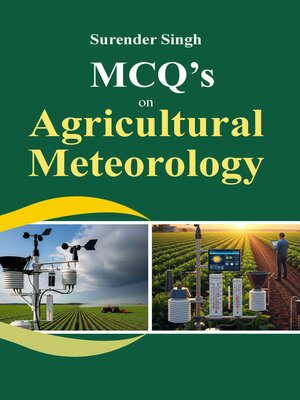
Sign up to save your library
With an OverDrive account, you can save your favorite libraries for at-a-glance information about availability. Find out more about OverDrive accounts.
Find this title in Libby, the library reading app by OverDrive.



Search for a digital library with this title
Title found at these libraries:
| Library Name | Distance |
|---|---|
| Loading... |
MCQs on Agricultural Meteorologyis a specialized academic resource crafted to support students, researchers, and aspirants preparing for competitive examinations in the field of agrometeorology. Bridging the disciplines of meteorological science and agricultural practices, this subject is increasingly critical in the face of climate variability, resource management challenges, and the global push for sustainable agriculture.This compilation offers a well-curated collection ofMultiple Choice Questions (MCQs)across the core themes of: Weather elements and instrumentation Crop-weather relationships Agroclimatic classification and zoning Weather forecasting techniques Agrometeorological advisory services Climate-resilient agricultural practices Simulation modeling in crop-weather systems Remote sensing and GIS applications in agrometeorology Each section is aligned with the curricula of national agricultural universities and major competitive exams such as those conducted byICAR, ASRB, and other agricultural/allied service bodies. The MCQs are designed to test comprehension, strengthen conceptual clarity, and promote self-assessment, enabling readers to identify and address knowledge gaps effectively.Combining theoretical knowledge with practical insight, this book serves as: Arevision toolfor quick review Aclassroom companionfor structured learning Aready referencefor interdisciplinary applications in agrometeorology By integrating scientific rigor with application-oriented framing,MCQs on Agricultural Meteorologyempowers readers to make informed decisions in crop planning, climate risk mitigation, and sustainable food production. It contributes meaningfully to capacity-building in agricultural meteorology and supports the broader vision of climate-smart agriculture.







